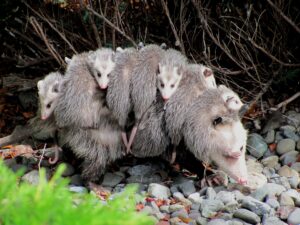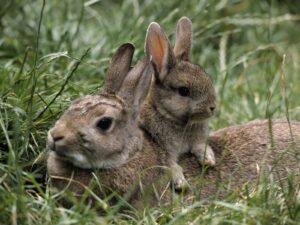By Dr. Beth Leermakers
Spring has arrived, and so have the baby animals. If you find a baby bird, possum or squirrel on its own, should you rescue it? Probably not. In many cases, it’s normal for wildlife babies to be on their own temporarily. Rescuing a wild animal that doesn’t need help decreases its chance of surviving. According to the National Wildlife Federation (NWF): “Though it might seem harsh, it’s normal and natural that not all wild animals survive to adulthood. Letting nature take its course is usually the best thing to do.” According to the NWF, the exception is when an animal has been injured as a direct result of human activity — being hit by a car, striking a window, getting attacked by a dog or cat, or falling from a nest during tree trimming — or if you saw its parent being killed and know the baby is orphaned.

Photo courtesy of Wikipedia
When you find any wild animal — baby or adult — in need of help, the best thing to do is contact a licensed wildlife rehabilitator (tpwd.texas.gov/huntwild/wild/rehab/list/) or local wildlife rescue center (check out dfwwildlife.org — a solution-driven hotline — or rogerswildlife.org for birds). Caring for wild animals is a round-the-clock job that requires special training — it’s not an appropriate DIY activity. It’s illegal to keep and care for wild animals without a state-issued license. Do NOT attempt to give any food or liquids to any wild birds or mammals.
Follow these species-specific guidelines to decide whether to intervene when you find a baby animal in your yard or neighborhood:
Birds
Birds are often found on the ground in the spring. Nestlings — babies that are featherless or covered in fluffy down — should be returned to their nest if possible. To locate the nest, look and listen for the adult birds. If you can’t find or reach the nest, place the baby bird in a hanging basket with drainage and hang the basket from a tree limb or attach it to the trunk near where you found the bird. Don’t worry about handling the baby bird. The parents will NOT reject the baby if you touch him. Wait and watch for the mother bird to return. If she doesn’t return within two hours, contact a wildlife rescue center or licensed rehabilitator.
Fledglings — fully feathered young — are normally out of their nest. They spend several days on the ground, hiding in vegetation and waiting until they can fly. Their parents continue to feed and care for the fledglings, so they don’t need any help. Taking fledglings out of the wild reduces their chance of survival. However, if the bird is in the street or otherwise in harm’s way, you should move him to thick vegetation close to where you found him so the parents can continue feeding him.
Opossums
Baby possums often fall off their mother’s back while they’re traveling. Mother opossums, who aren’t aware that they lost their babies, never come back for them — leaving them vulnerable to predators. You should rescue a baby opossum that is less than 8” from its nose to its rump (excluding its tail). A dollar bill is 6” and makes a good ruler. If the baby is 8” or longer, seems healthy, has no injuries or visible parasites, and isn’t attracting ants or flies, the opossum doesn’t need rescuing.
If the baby is thin and lethargic — even if it’s longer than 8” — contact a wildlife rescue center/rehabilitator. Opossums can have flea anemia, so a skinny, listless orphan may need help.
Squirrels
Mother squirrels give birth in a leafy nest built in the branches or inside tree cavities. A baby squirrel on the ground with its eyes closed or that can’t move is too young to be away from its mother and could be injured, dehydrated or malnourished. If the baby is not injured, place her in a box with soft cloth and put the box at the base of a tree for the mother to retrieve. If the mother doesn’t pick up her baby within 2-3 hours, or if the squirrel is injured, contact a wildlife rehabilitator. Don’t try to feed or raise the squirrel. Baby squirrels require special care and must be fed a specific formula every few hours around the clock.

Photo courtesy of Facebook
Rabbits
If you find baby bunnies in a nest in your yard, they are probably not orphans. Mother rabbits leave their nest unattended for most of the day to avoid attracting predators.
The babies’ fur camouflages them, and — unlike human babies — they instinctively stay still and quiet. Keep your cat, dog and people away from the nest, and watch to see if the mother returns. Removing rabbits from the wild reduces their chance of survival. You should leave rabbits in the nest/den alone unless they are injured, covered in flies/ants, or the nest has been disturbed by predators.
If you’re eager to take care of adorable baby animals, contact Dallas Animal Services or another animal shelter and volunteer to foster puppies or kittens. Shelters often need people willing to bottle feed orphaned puppies and kittens.
